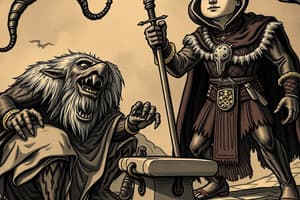Podcast
Questions and Answers
Which of the following is not mentioned as a character trait commonly associated with medieval heroes in the passage?
Which of the following is not mentioned as a character trait commonly associated with medieval heroes in the passage?
- Loyalty
- Humility (correct)
- Bravery
- Honor
What is the primary focus of the literary analysis discussed in the passage?
What is the primary focus of the literary analysis discussed in the passage?
- The themes of power, glory, and fate in the epic poem
- The historical context of the Old English literature
- The characterization of the protagonist Beowulf (correct)
- The poetic techniques used in the writing of Beowulf
What is the role of King Hrothgar in the epic poem Beowulf, according to the passage?
What is the role of King Hrothgar in the epic poem Beowulf, according to the passage?
- He is the friend of Beowulf, and their shared battles against monsters are crucial (correct)
- He is the rival of Beowulf, competing for power and glory
- He is the ruler who banishes Beowulf from the kingdom
- He is the father of Beowulf, guiding him on his adventures
Which of the following is not mentioned as a central theme in the epic poem Beowulf?
Which of the following is not mentioned as a central theme in the epic poem Beowulf?
How does the passage describe the character of Beowulf?
How does the passage describe the character of Beowulf?
What is the significance of the character Wiglaf in the epic poem Beowulf, according to the passage?
What is the significance of the character Wiglaf in the epic poem Beowulf, according to the passage?
What is the purpose of using alliteration in 'Beowulf'?
What is the purpose of using alliteration in 'Beowulf'?
Which poetic technique in 'Beowulf' is used to describe something by what it is associated with rather than its actual name?
Which poetic technique in 'Beowulf' is used to describe something by what it is associated with rather than its actual name?
What impact did 'Beowulf' have on later works like Chaucer's 'Canterbury Tales'?
What impact did 'Beowulf' have on later works like Chaucer's 'Canterbury Tales'?
What do kennings in 'Beowulf' contribute to the reader's experience?
What do kennings in 'Beowulf' contribute to the reader's experience?
Which theme from 'Beowulf' continues to resonate with readers today?
Which theme from 'Beowulf' continues to resonate with readers today?
How does 'Beowulf' provide insights into the human condition?
How does 'Beowulf' provide insights into the human condition?
Flashcards are hidden until you start studying
Study Notes
Beowulf: A Medieval Epic's Journey Through Literary Analysis
The epic poem "Beowulf," one of the oldest surviving works from Old English literature, has been a subject of fascination and literary analysis since its creation in the late 8th century. This ancient text tells the story of Beowulf, a legendary hero who embarks on a series of adventures in his quest for glory. In this article, we will delve into the various aspects of "Beowulf" from different perspectives, including characterization, themes, and poetic techniques.
Characterization: Beowulf and Friends
One of the most intriguing elements of "Beowulf" is its characters. The titular protagonist, Beowulf himself, is portrayed as a noble warrior with immense strength and determination. He embodies the traits commonly associated with medieval heroes, such as bravery, loyalty, and honor. However, he also displays human weaknesses like pride and ambition.
Other notable characters include King Hrothgar, whose friendship with Beowulf plays a crucial role in their shared battles against monsters; Unferth, a prideful nobleman who mocks Beowulf; and Wiglaf, Beowulf's loyal nephew who aids him during his last battle. Each character offers unique insights into the nature of humanity, courage, and power dynamics within a hierarchical society.
Themes: Power, Glory, and Fate
A central theme in "Beowulf" is power. Whether it's the political power held by kings or the personal power wielded by warriors, the poem explores how individuals navigate these complex systems. It also touches upon the concept of glory, which can often drive people towards acts of heroism or self-destruction, depending on one's interpretation of fame and prestige. Lastly, fate, predetermined destiny, looms over every action taken in the narrative, adding an air of inevitability to events.
Poetic Techniques: Alliteration and Kennings
The Anglo-Saxon language used in "Beowulf" employs several poetic techniques that contribute to its rhythmic and engaging nature. One such technique is alliteration, where multiple words in a line begin with the same consonant, creating a musical quality to the text. Another technique is the use of kennings, compound phrases that describe something by what it is associated with rather than its actual name. For instance, "sea serpent" is a kenning for dragon. These poetic devices enhance the storytelling and create a vivid imagery in the reader's mind.
Impact and Legacy: From Oral Tradition to Modern Interpretations
"Beowulf" has had a profound impact on English literature and culture. As an oral tradition passed down through generations before being committed to parchment, it reflects the storytelling techniques and values of Anglo-Saxon society. Its influence can be seen in later works like Chaucer's "Canterbury Tales," which borrow elements from "Beowulf". Moreover, its themes of heroism, power, and fate continue to resonate with readers today.
In conclusion, "Beowulf" is a richly layered epic that offers ample material for literary analysis. Its characters, themes, and poetic techniques provide a window into medieval culture and offer insights into the human condition. Whether read as a historical artifact or a timeless tale of heroism, "Beowulf" remains a captivating work worthy of exploration and appreciation.
Studying That Suits You
Use AI to generate personalized quizzes and flashcards to suit your learning preferences.




